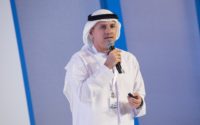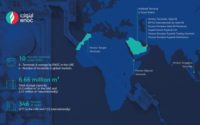Sustainable, Aged-Friendly House Wins Accolades At Solar Decathlon Middle East 2018
A sustainable, innovatively designed house that additionally supports people suffering from age-related disabilities was among the projects that stole the limelight at the Solar Decathlon Middle East 2018 held at the Mohammed Bin Rashid (MBR) Solar Park recently.
‘Desert Rose’, a joint project of 40 students from UOW Australia and Dubai as well as TAFE NSW (a leading provider of vocational education and training in Australia), won the second place in the decathlon. The team spent two years creating, prototyping and building a design that not only addressed the competition criteria, but also factored in the challenge of supporting people living with dementia and other age-related disabilities.
The Solar Decathlon Middle East 2018 is dubbed the “Energy Olympics”. 15 teams from 11 countries designed and built sustainable homes across 10 themes, from architecture to sustainability, with the added challenge of creating a design that is functional and suited to the desert heat.
The ‘Desert Rose’ team spent two weeks building the house at the Mohammed Bin Rashid (MBR) Solar Park. After final judging, Desert Rose was hailed one of the world’s best examples of sustainability and design innovation.
A team from Virginia Tech won the first place with ‘FutureHAUS Dubai’, while the University of Bordeaux-led ‘Baity Kool’ won the third spot in the competition that was created by the US Department of Energy. More than 600 team members from more than 28 education institutions around the world, representing 54 nationalities, entered the competition.
“This project brought together top talent from our Australian and Dubai campuses, doing an extraordinary job of combining knowledge and expertise to create a world-class prototype. It is an outstanding achievement and showcases what our new generation of innovators and industry professionals are capable of doing in the future”, commented Professor Khalid Hussain, Dean of the Faculty of Information Science and Engineering, UOWD.
Project Manager and UOW PhD student Clayton McDowell said: “We’ve created innovative solutions that we hope will revolutionise the way we design and build homes that celebrate life, support wellbeing for people as they age, and provide practical solutions for one of society’s great challenges of an ageing population.”
The final award ceremony took place at the Mohammed Bin Rashid (MBR) Solar Park, attended by Shaikh Mansour Bin Mohammad Bin Rashid Al Maktoum and other UAE dignitaries, as well as Solar Decathlon creator Mr Richard King.
The entire team was in attendance and UOW was also represented by UOW Deputy Vice-Chancellor (Research & Innovation) Professor Judy Raper and TAFE NSW Regional General Manager Kerry Penton.
UOW Vice-Chancellor Professor Paul Wellings CBE hailed the team’s vision, hard work and willingness to take on monumental challenges, while congratulating everyone who has been a part of Team UOW over the past two years.
“For the Desert Rose to be considered one of the world’s best examples of innovation in sustainable design as well as incorporating features that look over the horizon to address the growing challenge of an ageing population is an achievement of a magnitude and importance that will grow with time,” commented Wellings.
TAFE NSW Regional General Manager Kerry Penton said: “This project has been an impressive undertaking for Team UOW Australia-Dubai and to have TAFE NSW as part of that team is a wonderful example of what we can achieve together. I’m extremely proud of the collaboration and of the way the students and teachers involved have focused on innovation technology and teamwork.”
The house will be dismantled and shipped back to Australia to be permanently placed at UOW’s Innovation Campus where it will be used to further the University’s efforts to support innovation in health and wellbeing.







